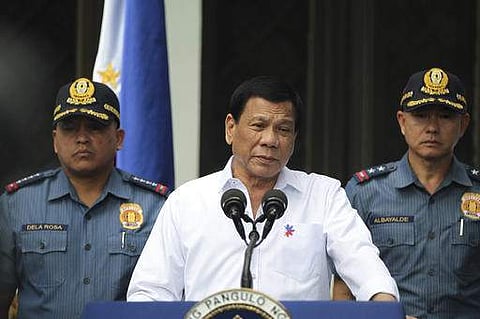

MANILA: Philippine President Rodrigo Duterte apologised to Germany on Tuesday for failing to save a German hostage, who was beheaded by Muslim militants, and said a massive offensive backed by fighter jets against the extremists was underway.
Philippine military officials said Jurgen Gustav Kantner was beheaded by Abu Sayyaf militants in the southern jungles after a ransom deadline lapsed Sunday. The militants circulated a video of the beheading Monday, but his remains have not been found.
In Germany, Chancellor Angela Merkel condemned "this abominable act, which shows once again how inhumane and without conscience these terrorists act," spokesman Steffen Seibert said in a statement. "We must all stand together to fight against them."
"I am very sorry that the hostage or a national of your country has been beheaded. I sympathise with the family. I commiserate with the German people," Duterte said in a news conference.
"We really tried our best. We have been there, the military operation has been going on for some time already but we have failed," he said, but he added the Philippine government did not surrender its policy of paying ransom, which he said would just enable the militants to grow in number.
Duterte outlined the steps his government has taken to quell a wave of kidnappings by Muslim militants, including a request he made to China to help patrol the international waters bordering the southern Philippines, Malaysia and Indonesia where many piracy incidents and abductions have happened.
"I asked China if it can contribute to patrolling because the might of China in terms of sea power is a huge one," he said, adding China has not responded to his request.
Military chief of staff Gen. Eduardo Ano told reporters that troops clashed with the Abu Sayyaf militants holding Katner a day before he was beheaded but about six gunmen managed to remove him from the battle scene near Sulu's Indanan town. The militants behind the beheading were led by a young commander, Moammar Askali, who uses the nom de guerre Abu Rami, Ano said.
An intelligence report seen by The Associated Press said Askali had wanted Kantner to be killed as they had announced they would but other militants wanted to wait out for a ransom payment, which officials said amounted to 30 million pesos ($605,000).
The Abu Sayyaf had claimed in November to have kidnapped Kantner and killed a woman sailing with him. A woman's body on a yacht was found later.
The Abu Sayyaf, named as a terrorist organisation by the Philippines and the U.S., has more than 20 foreign and local hostages in its jungle encampments.
Duterte has ordered troops to destroy the group because its ransom kidnappings were endangering sea traffic in the waters bordering the southern Philippines, Malaysia and Indonesia. The three countries have made efforts to jointly shore up security but kidnappings have persisted.